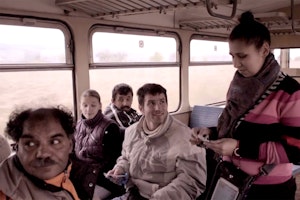Institutionalization Will Not Solve the U.S. Gun Problem
By Judith Klein

The school shooting in Parkland, Florida, has added some new players—and some old baggage—to the debate over guns and mental health.
The new players, the students from Marjory Stoneman Douglas high school who started the #neveragain movement, are leading a challenge against political complacency. The early signs are hopeful. If the movement keeps rolling, it will be the first student-organized and unified protest against mass shootings in U.S. history.
The old baggage, on the other hand, is the attempt to turn a debate over guns into a debate over “institutionalizing” potentially violent people before they have the chance to act. President Trump has been the most prominent figure supporting this idea, offering it during a White House meeting with Florida state and local officials.
“We’re going to be talking about mental institutions,” Trump promised, “and when you have some person like this, you can bring them into a mental institution, and they can see what they can do. But we’ve got to get them out of our communities.”
President Trump’s comments echo the “bring back the asylum” argument that has recently gained support from some academics and doctors. Locking people up long term, they say, will help remedy the “failure of community mental health care.”
But what is community mental health care? And how does it differ from institutionalization?
More than 50 years ago, largely in response to exposés of the inhumane, unspeakable conditions of people with mental illnesses warehoused in state mental hospitals across the country, President John F. Kennedy initiated the Community Mental Health Act.
The law had two parts: First, release people from hospitals into community health centers. Second, create conditions in which they had a chance to live independently, or with their families, and get the treatment they need. Help people, save money, reduce discrimination—it was a public policy trifecta.
So why didn’t it work? Because the second and crucial component—nurturing community-based supports—never reliably materialized. Fewer than half of the community health programs outlined in the policy’s budget, for example, were even built. A messy patchwork of services, incapable of helping all of those in need, eventually came to fill the void.
A few people were lucky enough to use that system, inadequate as it was, to find their way to freedom. But most were not. Instead of staying in their homes, they ended up homeless; instead of being provided with treatment, they ended up neglected; instead of living independently, they ended up shuttered away in prisons.
Their suffering—which is the suffering of real human beings, people with loved ones, hopes, and dreams—has been immense. And in much of the world, it is ongoing. Despite being a kind of hell on earth, these long-stay psychiatric institutions, these human warehouses, flourish all over the world.
Americans should not fool themselves into thinking these policies would fare better in the United States, either. As my colleague Aryeh Neier, the president emeritus of the Open Society Foundations, told me, for President Trump’s idea to work, “enormous numbers of American people would need institutionalization, for the long term, at immense cost. Inevitably, to try to save money, the institutions would be simply prisons. And they would still not reach people who [previously] never showed signs of mental illness.”
I know, firsthand, that there is a better way.
I have worked for more than 20 years to end the horror of institutionalization. I have seen living proof of what holistic, person-centered community care can do for those with chronic and serious mental illnesses. I have witnessed what can happen when these people—the people who are the program, really—are put first.
In response to those urging a return to institutionalization, then, we must echo the Marjory Stoneman Douglas high school students’ rallying cry—never again.
Until March 2019, Judith Klein was a senior adviser to the Open Society Public Health Program.


